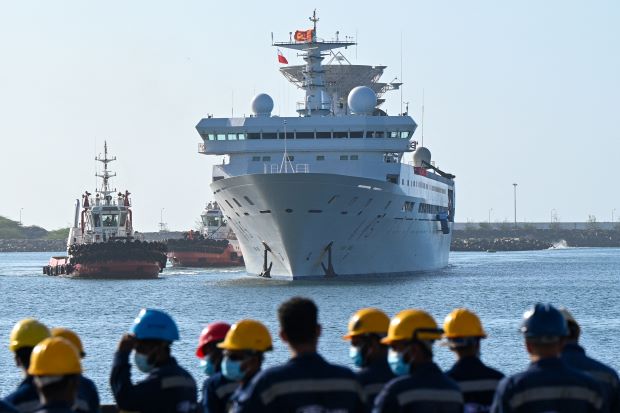Indian accuses Chinese envoy in SL of violating diplomatic etiquette
NEW DELHI – After a Chinese ambassador claimed that Sri Lanka was “unreasonably” pressured to cancel the docking permit of a Chinese ship, India on Saturday (27) accused him of violating “basic diplomatic etiquette” and alleged that the geopolitical importance attributed by China to the vessel docking “gave away” its actual purpose.
On August 26, Sri Lanka Guardian, published an article by China’s ambassador to Sri Lanka, Qi Zhenhong, in which he sought to draw parallels between the visit of US House Speaker Nancy Pelosi to Taiwan and the visit of a Chinese research vessel, Yuan Wang 5, to the Hambantota port.
“Those two matters may seem irrelevant and thousands of miles apart, but both share a same great significance between China and Sri Lanka, that is to jointly safeguard each other’s sovereignty, independence, and territorial integrity,” the Chinese envoy wrote.
The article was titled, ‘From One-China Principle to Yuan Wang 5: Let’s Join Hands and Resolutely Safeguard Our Sovereignty, Independence and Territorial Integrity’
While Qi didn’t mention India by name in the article, he claimed that earlier in August, both China and Sri Lanka had “altogether resisted the rude and unreasonable interference from third parties” to block the docking of Yuan Wang 5.
India and the United States had expressed concern about the docking of the Chinese vessel at the Hambantota port, worried over the suspected dual military capabilities of the ship.
Sri Lanka had first asked China to indefinitely defer the ship’s arrival, but then cleared Yuan Wang 5’s docking, much to India’s chagrin. It reached the southern Sri Lankan port – incidentally developed and leased by a Chinese firm – on August 16 to a red-carpet welcome and departed on schedule on August 22.
In three tweets, the Indian High Commission in Sri Lanka used unusually sharp language to respond to the Chinese ambassador.
“His violation of basic diplomatic etiquette may be a personal trait or reflecting a larger national attitude,” posted the Indian mission on the social media platform on Saturday night.
It then claimed that the Chinese diplomat was projecting China’s behaviour onto India. “His view of Sri Lanka’s northern neighbour may be coloured by how his own country behaves. India, we assure him, is very different”.
India pointed out that the importance given by China to the visit by Yuan Wang 5 was a clear indication that the ship had other functions besides that of a purely scientific manner.
“His imputing a geopolitical context to the visit of a purported scientific research vessel is a giveaway,” the Indian high commission tweeted.
In his article, the Chinese ambassador had written that Sri Lanka was standing “proudly” after having “overcome aggression from its northern neighbour for 17 times, colonization by the west for 450 years, and an anti-terrorism war for nearly 3 decades”.
“Any infringement on the national sovereignty, independence and territorial integrity of Sri Lanka shall not be tolerated,” he wrote.
Stating that approval of a foreign vessel’s port call was the sovereign decision of Sri Lanka, the Chinese diplomat alleged, “External obstruction based on so called “security concerns” but without any evidence from certain forces is de facto a thorough interference into Sri Lanka’s sovereignty and independence”.
He asserted that due to the “joint efforts” of China and Sri Lanka, “the incident was resolved properly, which not only safeguards Sri Lanka’s sovereignty and independence, but also defend the international fairness and justice once again”.
In its response, India suggested that Sri Lanka has a significant external debt burden as China had funded major infrastructure projects without transparency.
According to media reports, Sri Lanka owes nearly $7 billion to China, accounting for 6.2% of Colombo’s total central government debt. The International Monetary Fund (IMF), negotiating with Sri Lanka over a financing loan, advised Colombo to start debt restructuring talks with China.
Alluding to China’s soft loans, the Indian High Commission posted, “Opaqueness and debt driven agendas are now a major challenge, especially for smaller nations. Recent developments are a caution”.
“Sri Lanka needs support, not unwanted pressure or unnecessary controversies to serve another country’s agenda,” it added.
Earlier this month, India had rejected “insinuations” from China that it was unjustified for third parties to pressure Sri Lanka over the ship. “We reject the insinuations in the statement about India. Sri Lanka is a sovereign country and makes its own independent decisions,” the MEA spokesperson said on August 13.
-thewire.in



Comments are closed, but trackbacks and pingbacks are open.